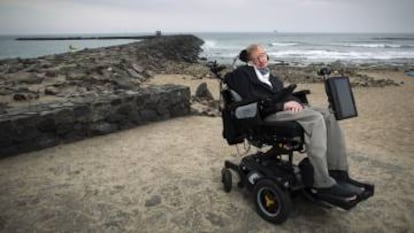Starmus science fest quits Spain, citing lack of financial support
Global science and arts event moves to Norway after top Spanish firms fail to provide backing


Citing lack of sponsorship from Spain’s leading companies, Starmus, the world’s biggest scientific festival, has announced that its fourth edition will not be held on the Canary Islands, and is moving instead to Trondheim, in Norway.
In a press release, Starmus, which describes itself as an "international gathering celebrating astronomy, space exploration, music, art, and sciences such as biology and chemistry", said that the 2017 event would feature Stephen Hawking.
But the regional government of Tenerife, the Canary island where Starmus has been held for the last three years, said that it had not been contacted by the organizers, who include former Queen guitarist Brian May, before the decision.
Around 400 years ago, Spain led exploration. I wonder how much of that legacy remains: not much I suspect Starmus organizer Neil deGrasse
“We would have liked to be told rather than reading about it in the media, out of courtesy,” said Alberto Bernabé, the head of Tenerife’s tourism department. He said that Tenerife’s local government and the regional administration of the Canary Islands sponsored the event to the tune of €660,000 between them. “That amounts to around 80% of the total cost,” he added.
Set up in 2011, the Starmus Festival is the brainchild of astrophysicist Garik Israelian and aims to make science and art accessible to the public. The first three festivals were sell-out events, attracting the world’s most influential scientists and astronomers, many of them Nobel Prize winners, along with internationally famous musicians. Among the guest speakers have been Neil Armstrong, the first man on the moon, science writer Neil deGrasse Tyson, economist Joseph Stiglitz, biologist and author Richard Dawkins, and Brian May, who holds a Ph.D in Astrophysics.
“I am disappointed that large corporations have said they will not support the festival and that it doesn’t matter to them,” said deGrasse.

Bernabé agreed that it has proved difficult to attract sponsorship from multinationals. “The organizers targeted Spain’s Ibex-35, the index of leading Spanish companies, but they failed.”
Anselmo Pestana, head of the local government of La Palma, which jointly hosts the event and contributes €90,000 toward the costs, said he had been told by Garik Israelian that one of the reasons the organizers had decided to hold next year’s event in Trondheim was because of delays in payment from the regional and local governments.
“It seems there were delays and this caused problems because they weren’t able to pay their suppliers,” said Pestana. The Tenerife local government denied that there had been payment delays, and that a final tranche of €76,000 to cover the cost of a report on the festival had just been handed over.
The first Starmus festival, in 2011, lost money, said Israelian. The second, held in 2014, barely covered its costs, despite Tenerife’s insistence that the some 171 million people were aware of the event through the global media. This year, that figure rose to 415 million, but no Spanish companies saw the value in being associated with the event.
I am disappointed that large corporations have said they will not support Starmus Starmus organizer Neil deGrasse
“It’s very sad, because this is an event that should be attractive to sponsors, but it seems that science doesn’t sell,” said Bernabé, adding that the Canary Islands government was already talking to Starmus about bringing the event back to Spain for 2018.
“But there is a risk it won’t come back, because it’s already a globally recognized event,” he warned.
Israelian, who is based at the Canary Islands Astrophysics Institute on Tenerife, declined to comment to EL PAÍS on the talks, but sources at Starmus said there was no reason for it not to return to Spain in two years time.
Speaking to Spanish journalist Iñaki Gabilondo at this year’s event, Neil deGrasse commented on Spain’s diminishing role in science. “Around 400 years ago, Spain led exploration. I wonder how much of that legacy remains: not much I suspect.”
He added that the world’s leading scientists had come to Starmus in the hope of reviving Spain’s role in scientific investigation. “That’s why I’m so disappointed that big companies are saying they won’t support the festival, and that it doesn’t seem to matter to them. If the country doesn’t grasp this, it will always be behind the curve when it comes to science.”
English version by Nick Lyne.
Tu suscripción se está usando en otro dispositivo
¿Quieres añadir otro usuario a tu suscripción?
Si continúas leyendo en este dispositivo, no se podrá leer en el otro.
FlechaTu suscripción se está usando en otro dispositivo y solo puedes acceder a EL PAÍS desde un dispositivo a la vez.
Si quieres compartir tu cuenta, cambia tu suscripción a la modalidad Premium, así podrás añadir otro usuario. Cada uno accederá con su propia cuenta de email, lo que os permitirá personalizar vuestra experiencia en EL PAÍS.
¿Tienes una suscripción de empresa? Accede aquí para contratar más cuentas.
En el caso de no saber quién está usando tu cuenta, te recomendamos cambiar tu contraseña aquí.
Si decides continuar compartiendo tu cuenta, este mensaje se mostrará en tu dispositivo y en el de la otra persona que está usando tu cuenta de forma indefinida, afectando a tu experiencia de lectura. Puedes consultar aquí los términos y condiciones de la suscripción digital.








































